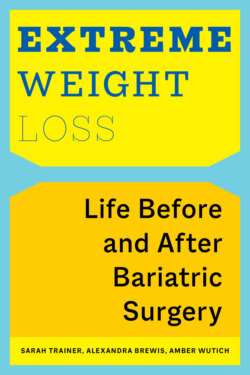Extreme Weight Loss

Реклама. ООО «ЛитРес», ИНН: 7719571260.
Оглавление
Amber Wutich. Extreme Weight Loss
Extreme Weight Loss. Life Before and After Bariatric Surgery
Contents
Introduction
It’s Not Just about Weight—It’s about Fitting In
The Path to This Book
Organization of the Book
A Word about Language
Questions to Frame Subsequent Reading
1. Weight as Pathology
Life before Surgery: The Physical Suffering of Morbid Obesity
Enrolling in the Program: “You Have to Buy In”
The Effects of Gender, Race, and Age on Program Enrollment and Experiences
Framing Bariatric Surgery as Medically Necessary
Teaching Participants the Biomedical Framework
Anita
Tiffany
Charles
Fred
2. Weight as Judgment
Burden #1: Fat Bodies Are Consistently Devalued
Clara
Shannon
Joyce
Ava
Burden #2: Excess Weight Is Immoral
Burden #3: Judgment in Clothes and Spaces
Burden #4: Weight Is Seen as Risky and Burdensome
Sofia
Emily
Martha
Moving from Shame to Success
3. Weight Loss as Success
Weight Loss, “Controlled” Eating, and Compliance
Chronicity, Cures, and Not Being a Burden
Fitting
Compliments and Accusations
The New Normal?
When the Honeymoon Is Over
4. Weight, Worry, and Surveillance
Health Remains a Balancing Act
Lifelong Consequence #1: Self-Surveillance of Eating
Lifelong Consequence #2: Self-Surveillance of Weight
Lifelong Consequence #3: Oh, the Skin!
Lifelong Consequence #4: A Daunting Timeline
Reflections on What It Means to Be Normal
Conclusion
Epilogue
Acknowledgments
Appendix A. Ethnographic Methods. Background
Participant Interviews: A Panel Design
Semistructured Interviews
Coding and Analysis of Ethnographic Data
Appendix B. The Survey
Survey Excerpt. Part 1: Surgical & Weight History Questions
Part 2: Health-Related Quality of Life Questions
Part 3: Daily Activity Questions
Part 4. Diet and Eating Questions
Part 5: Treatment by Others Questions
Notes. Introduction
1. Weight as Pathology
2. Weight as Judgment
3. Weight Loss as Success
4. Weight, Worry, and Surveillance
Conclusion
Appendix A
Appendix B
References
Index
About the Authors
Отрывок из книги
Sarah Trainer, Alexandra Brewis, and Amber Wutich
NEW YORK UNIVERSITY PRESS
.....
In 2010, we conducted a set of standardized surveys across a range of different low- and middle-income countries in East Africa, the island Pacific, and South America. We found that consistently strong anti-fat sentiments had become normalized across all the cultures we surveyed.18 This was a shocking finding at the time because many of the cultures we studied were still thought of as fat loving. Yet people consistently identified fat as unhealthy and unwanted and categorized fat individuals as lazy, uneducated, and unmotivated.
Of course, this was not a monolithic attitude; our samples were biased toward urbanites, who were regularly exposed to transnational media messages that equate fatness with badness and public health messages that stress obesity as a risky health condition. Additionally, there were people across all settings who stated that they found large bodies (including their own) not only acceptable but even good. Existing ethnographic research in diverse cultural settings also shows that people may simultaneously hold positive and negative ideas about fatness versus obesity and may focus on the negative frameworks when asked in an official capacity to provide ideas. In other words, long-standing cultural ideas that value larger size still retain power in many settings worldwide.19
.....